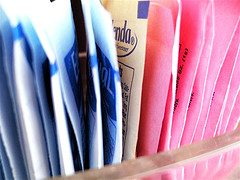Photo Amyvdh
I received the following question regarding a Blisstree post I wrote:
I read your article about several foods that we commonly mistake for being healthy. I saw the image of the fat-free, sugar-free pudding and read the description. I understand that the food probably has little to no nutritional value but I was curious why you thought sugar substitutes are unhealthy?
This is a very good question. When I was studying for my R.D. exam many moons ago I memorized a lot of information and random facts much of which I have since forgotten. One of the things I retained was the knowledge of eating disorder known as pica. Those with pica eat non-food substances such as dirt or soap; it’s quite serious. I’ve always likened eating fake foods such as sweeteners (saccharin, aspartame and sucralose), with “no nutritional value” to this disorder. If we don’t suffer from pica, what’s the appeal of food impersonators?
What was that? Oh you said the appeal is weight loss? Sorry to say that the increased use of sweeteners hasn’t made us thinner. Many sugar free foods are equal to or only slightly lower in calories than their regular counterparts. Furthermore, a study from the European Journal of Clinical Nutrition showed that artificial sweeteners do not “turn on” satiety signals the way sugar (protein or fat) does which can encourage those eating them to eat more. And a Purdue University study showed that artificial sweeteners might actually disrupt the body’s natural ability to gauge calories. In short, sweeteners do not satisfy us and may affect our ability to achieve satiety from other foods.
Artificial sweeteners have been linked with headaches (aspartame most often connected), GI distress, insomnia and heightened PMS (no thank you). Plus, as Planet Green pointed out, as I stare at my recycling bin, there has to be a better use of the paper that goes into millions of these packets of this stuff.
The FDA says these sweeteners are safe but also finds genetically modified foods and artificial colorings safe. I have read a bunch of studies, connecting sweeteners to leukemia and brain malignancies, that don’t make them sound so safe. The truth is these sweeteners are questionable at best and only time will tell exactly. No study has tested very long term effects or synergistic potential of multiple sweeteners over a lifetime. I, for one, would rather be skeptical than sick any time. I wouldn’t give these substances to my children and therefore don’t eat them myself. I save my “chemical” ration for my hair color.
What is your sweetener, artificial or otherwise, of choice? Do you think something is safe if the FDA approves it? Have you ever had an adverse reaction to a sweetener you’d like to share?
Another post I wrote on sweeteners, the real ones.
|
|



I used to use Splenda all of the time, but I have been off of that and all other artificial sweeteners for a few years now. I am always shocked when I hear new clients are using 4 packs of the stuff in their coffee and having a few cups a day!! I agree, I would rather be safe than sorry and sick. There just isn't enough evidence/research to convince me they are safe to consume. I would rather just have a little real sugar. At least we know what that will do to us.
Melissa you raise a great point. We (the public) should have to be shown that things are safe. "Not enough evidence unsafe" seems like faulty logic.
The FDA can't do studies that examine the long term consequences of consuming 4 packs of Splenda per day with all the other factors that we encounter. I stay away from this stuff primarily because it tastes bad – and I think the road to healthy weight loss includes whole foods and not fake foods.
Such an important post that of course has me pondering the philosophical dichotomy between "natural" and "artificial" (I know I'm a dork!) I ingest far less artificial sweetener than I used to. That said, I have been using Truvia in my coffee. Don't adore the taste, but have gotten used to it. Is this stuff okay or is it just another offender?
Thankfully, never touched the stuff and was never allowed to (my mom banned diet soda, Crystal Light…actually most processed foods and for this I am now thankful). When the majority of the medical community agrees on something (the ones not employeed by the FDA or certain brands) then it's time to take note. Toxic. Thanks for writing this – I posted on FB and Twitter so all of my friends who think diet soda is an appropriate beverage will now, hopefully, think twice.
I found giving up artificial sweeteners more difficult than giving up sugar. The diet coke detox headaches were the worst. Both are now pretty much out of our diet…except that I'm off to bake some oatmeal cookies right now.
I'd give up almost everything nonessential in life before giving up hair color.
I'm so glad you posted about this. The way you approach the topic states it perfectly…why put imitation foods in our bodies? What purpose do they serve! I used to survive off of artificial sweeteners when I was only concerned with weight-loss. Now I realize they don't do ANYTHING for my body, including weight-loss! Thank you for such a valuable perspective!
I am real sugar all the way love the way you think I need more turmeric he he for the health benefits like an RD
Snack Girl- I thought about that. Perhaps a sweetener alone isn't horrific but the synergy of the other factors in our food supply may tip us over the edge. Marie- they are hard to give up partially because intensely sweet, much more so than sugar.
I remember being taught to recommend "diet" foods with artificial sweeteners when I was studying to be an RD. Through my own research and experience, I have come to the same conclusions as you. Do you have a link/source for the leukemia connection?
I feel the research is sufficient to prove the safety of these artificial sweeteners in moderate amounts (if you are not allergic or outwardly sensitive). I personally do not use them, but they are a useful tool for diabetics or people who want something sweet (we're all human after all), but don't want to compromise their glycemic control (or lack of).
I disagree with the idea that because stevia is found in nature, it is any better than sweeteners made in a lab. Stevia is still a chemical compound – as are all foods. Just because something is found in nature does not mean it is good for us. Similarly, something made in a lab is not necessarily bad. There are plenty of herbal products that can kill us. One method of designing pharmaceuticals is to find useful compounds in nature and incorporate them into drugs. People often say we should only put things in our body that it recognizes. I don't think the body recognizes stevia anymore than it does saccharin, but because we are chemical factories, we can "process" these compounds.
Frankly, ALL the sweeteners have issues linked to them, natural or not.
The stevia comment wasn't directed towards anyone, BTW. I just brought it up because it is a common topic that goes along with artificial sweeteners.
No artificial sweeteners for me. I've definitely experienced headaches from aspartame, although I think this is very individual reaction as I know many people who don't have this problem. I've been working on getting my husband to reduce {maybe one day give up!} his diet coke. Right now he's down to one a day, which is pretty good.I'd like to see more research about stevia, as I have seen some older research linking it to liver damage.
I use real sugar, real butter…oh, real food is the best.
Alysa here are a couple studies (there are more):
• Soffritti M, Belpoggi F, Esposti DD, Lambertini L. Aspartame induces lymphomas and leukemia in rats. European Journal of Oncology 2005; 10(2):107–116.
Lim U, Subar AF, Mouw T, et al. Consumption of aspartame-containing beverages and incidence of hematopoietic and brain malignancies. Cancer Epidemiology, Biomarkers and Prevention 2006; 15(9):1654–1659.
Tands, interesting about diabetics that would be my exception to the "rule" though I still feel even they should minimize sweeteners of all types as sweet begets sweet. I am not strongly anti stevia, though I don't like the aftertaste/don't use it. EA- I got my hubby off the sodas, "baby" steps.
Yes, studying to become an RD in the late 80's I remember that we recommended sugar substitutes. Over time, I came to realize that this was not a good thing as reseach became more available stating that diet soda wasn't working for the things that we were recommending it for (weight loss, diabetes, etc). I remember having lunch with a (300 pound)friend who drank glass after glass of diet soda at a restaurant (the glass was large too)! I couldn't help but think that there was something wrong with this. How much better it would have been to drink water!
Thank you for the studies Lauren!